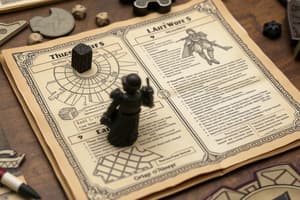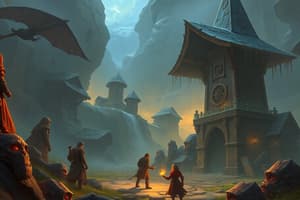Podcast
Questions and Answers
What is the primary role of the Dungeon Master (DM) in Dungeons and Dragons?
What is the primary role of the Dungeon Master (DM) in Dungeons and Dragons?
- Adjudicate rules and oversee the game (correct)
- Develop online streaming content
- Create characters for players
- Participate in combat as a player
What components are used in Dungeons and Dragons gameplay?
What components are used in Dungeons and Dragons gameplay?
- Only tablets and figurines
- Decks of cards for character actions
- Only standard six-sided dice
- Polyhedral dice and character abilities (correct)
Which edition of Dungeons and Dragons is currently the most widely played?
Which edition of Dungeons and Dragons is currently the most widely played?
- 3rd Edition
- 1st Edition
- 5th Edition (correct)
- 7th Edition
Which of the following is NOT a known Dungeons and Dragons campaign setting?
Which of the following is NOT a known Dungeons and Dragons campaign setting?
What do experience points (XP) primarily contribute to in a Dungeons and Dragons campaign?
What do experience points (XP) primarily contribute to in a Dungeons and Dragons campaign?
What is a common feature of game sessions in Dungeons and Dragons?
What is a common feature of game sessions in Dungeons and Dragons?
What distinguishes homebrew campaigns in Dungeons and Dragons?
What distinguishes homebrew campaigns in Dungeons and Dragons?
Which statement about character creation is true in Dungeons and Dragons?
Which statement about character creation is true in Dungeons and Dragons?
Flashcards are hidden until you start studying
Study Notes
Overview of Dungeons and Dragons (D&D)
- Type: Tabletop role-playing game (RPG)
- Creators: Gary Gygax and Dave Arneson; first published in 1974.
- Players: Typically 3 to 8 players including a Dungeon Master (DM).
Key Components
-
Players:
- Create characters with distinct abilities, backgrounds, and races.
- Role-play as their characters through scenarios.
-
Dungeon Master (DM):
- Oversees the game, narrates the story, and adjudicates rules.
- Constructs the game world, creates NPCs (non-player characters), and designs quests.
-
Character Creation:
- Choices of races (e.g., Human, Elf, Dwarf) and classes (e.g., Wizard, Fighter, Rogue).
- Utilization of ability scores: Strength, Dexterity, Constitution, Intelligence, Wisdom, Charisma.
- Character backgrounds providing backstory and skill proficiencies.
-
Gameplay Mechanics:
- Dice Rolling: Primarily uses polyhedral dice (e.g., d20 for attacks and saving throws).
- Turns: Players take turns during combat and explore actions like movement, actions, and reactions.
- Skill Checks: Resolve actions based on character abilities and situational modifiers.
-
Game Sessions:
- Sessions generally include exploration, combat, and social interaction.
- Advancement of story arcs and character development through experience points (XP).
Campaigns and Adventures
- Modules: Pre-written adventures that provide story frameworks.
- One-Shots: Short, self-contained adventures designed for a single session.
- Homebrew: Custom campaigns created by the DM.
Rules Editions
- Multiple editions exist, with the 5th edition (released in 2014) being the most widely played.
- Each edition introduces changes to rules, mechanics, and character options.
Cultural Impact
- Media Influence: Inspired movies, video games, and literature.
- Community and Events: Conventions (e.g., D&D Live), online streaming (e.g., Critical Role).
- Inclusivity: Strives for representation and diversity in gameplay and content.
Resources
- Core rulebooks: Player's Handbook, Dungeon Master's Guide, Monster Manual.
- Online platforms and tools for character sheets, rule clarifications, and virtual play.
Popular Settings
- Forgotten Realms: Grassroots fantasy setting known for rich lore.
- Eberron, Ravenloft, Dragonlance: Other well-known campaign settings.
Conclusion
Dungeons and Dragons is a dynamic blend of storytelling, strategy, and imagination, fostering creativity and collaboration among players in a fantastical world.
Dungeons and Dragons:
- Tabletop RPG: Created by Gary Gygax and Dave Arneson in 1974.
- Gameplay: 3-8 Players, including a Dungeon Master (DM).
Key Components:
- Players: Create and role-play distinct characters.
- Dungeon Master: Oversees the game, narrates the story, creates the world, NPCs, and quests.
- Character Creation: Choice of races (Human, Elf, Dwarf), classes (Wizard, Fighter, Rogue), and ability scores.
- Gameplay Mechanics: Utilizes dice rolling (d20 for attacks and saving throws), turns with movement, actions, and reactions, and skill checks based on abilities and modifiers.
- Game Sessions: Include exploration, combat, and social interaction. Players gain experience points (XP) for character development and story advancement.
Campaigns and Adventures:
- Modules: Pre-written adventures with story frameworks.
- One-Shots: Short, self-contained adventures for a single session.
- Homebrew: Custom campaigns created by the DM.
Rules Editions:
- 5th Edition: Most widely played edition, released in 2014.
- Edition Changes: Each edition introduces changes to rules, mechanics, and character options.
Cultural Impact:
- Media Influence: Inspired movies, video games, and literature.
- Community and Events: Conventions like D&D Live and online streaming platforms like Critical Role.
- Inclusivity: Strives for representation and diversity in gameplay and content.
Resources:
- Core Rulebooks: Player's Handbook, Dungeon Master's Guide, Monster Manual.
- Online Platforms: Tools for character sheets, rule clarifications, and virtual play.
Popular Settings:
- Forgotten Realms: A popular fantasy setting with rich lore.
- Eberron, Ravenloft, Dragonlance: Other well-known campaign settings.
Conclusion:
- Dungeons and Dragons combines storytelling, strategy, and imagination in a fantastical setting, fostering creativity and collaboration.
Studying That Suits You
Use AI to generate personalized quizzes and flashcards to suit your learning preferences.




